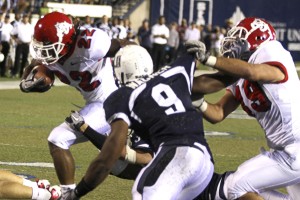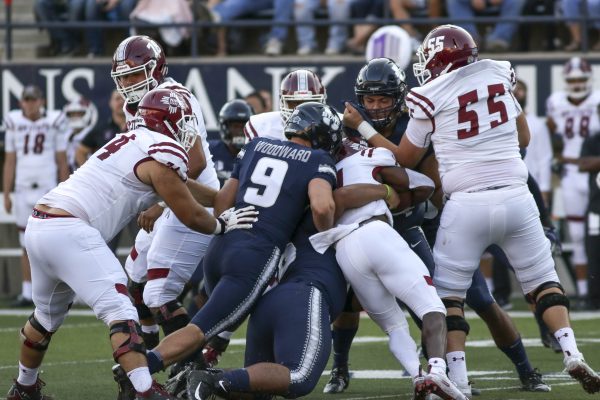No. 9: A coincidental tradition being carried on by David Woodward
Following his true freshman season, Utah State linebacker David Woodward had to change his number. During his rookie collegiate season (which he spent as a redshirt), the young man wore his high school number of 11 but Woodward had to yield the number to senior Damion Hobbs. So he picked out a new one.
The number he chose? Nine.
Woodward said he didn’t put much thought into the choice, but through pure chance or divine providence, the junior linebacker now shares a connection with several past Aggie legends through the numeral he sports on his jersey.
The last defensive specialist to don the number nine at Utah State before Woodward was Kyler Fackrell, an All-American outside linebacker now of the Green Bay Packers. Before Fackrell, future NFL Hall of Fame inside linebacker, Bobby Wagner donned the same singular digit on his jersey.
“It’s kind of cool,” Woodward said of the coincidence.” Hopefully I can live up to what they did.”
Living up to these past Aggie greats is no simple task and very easily said rather than actually produced. However, Woodward is uniquely suited for the task and was so even at the start of the 2018 season, his sophomore year.
Woodward stepped into a full-time starting role for the first time in his collegiate career in Utah State’s season-opener at Michigan State and made an immediate impact in the near upset of the 11th ranked Spartans. He led both sides in total tackles with 16. Woodward then went on to lead the Mountain West in tackles (134) and finished in the top 10 in the conference in sacks and tackles for loss.
What makes Woodward’s task to “live up to” Wagner, Fackrell and the like so interesting is the two-pronged nature of his challenge. Not only is the recently conceived tradition of the number nine on the line, Woodward is also carrying the bulk of the “Linebacker University” legacy those same two Aggies, among others, have promptly built over the past decade.

Aggie linebacker Bobby Wagner sheds a block in pursuit of the ball-carrier during a game against Fresno State. Wagner played four seasons for Utah State from 2008 to 2011. Photo by Todd Jones
The “others” in addition to Fackrell and Wagner, include the Vigil brothers, Zach and Nick (both of whom made it to the NFL) along with standouts such as Jake Doughty.
For most, the pressure of that kind of legacy might go to one’s head and cause problems. In Woodward’s case it apparently eases issues and propels him forward.
“Just knowing that a lot of good linebackers have come through here motivates me,” Woodward said.
These “good linebackers” live largely in USU’s past, but two coaches currently on staff — head coach Gary Andersen and assistant head/tight ends coach Frank Maile — are directly connected to those players, having coached them personally.
In addition to the USU linebackers, Andersen mentored several great players of the same position at Wisconsin and the University of Utah during his leave of absence from Logan. And in his mind, Woodward compares very favorably to any of the great athletes Andersen has coached.
“The thing that David has that all of those linebackers have had is incredible instincts. Things that you just don’t coach,” Andersen said. “The first initial read, the first initial step. David can also, like all of those guys that have been with us in the past, be physical as needed but he can be very squirmy and hard to find and hard to catch.”
Maile, who was a defensive positional coach from 2011 to 2017, very much shares the opinion of Andersen on the natural talent level in comparison to the former Aggie greats.
“He’s just as talented as those guys,” Maile said. “He’s got all the tools to be an elite linebacker.”
But while Maile noted the talent Woodward possesses, he compared another aspect of Wagner and co. to the current No. 9 on the team.
“Those guys were elite ‘backers but they grew every year,” Maile said. “We had to develop them, they did a great job on and off the field with getting themselves where they were supposed to be and where they wanted to go. We just guided them in that direction and David’s no different.”
Development is a theme with just about every position at a school like Utah State, being unable to snag recruits of more than three stars with any regularity. And true to Maile’s words, most of the linebackers took a year or two to get into legendary playing shape. Of the four featured USU linebackers mentioned thus far, only Fackrell made a significant contribution his freshman season — and he still redshirted his first year. So for Woodward, saying he simply showed up and performed ignores two full seasons of work he put in largely behind the scenes.
The culmination of those two years of his life was, as already noted, a stellar breakout sophomore season. But another side effect is that Woodward is creating a legacy for himself.
Woodward said himself that while he is well aware of the comparisons and his hopes to live up to the expectations and legacy laid out by now program legends, he is out to “be my own player and do the best that I can do.” He didn’t choose his number to be a copycat of Wagner, Fackrell, or anyone else. His legacy is his own.
In that goal of making a name for himself, Woodward’s early returns are fairly plentiful. He was a third-team Associated Press All-American selection last year, making him the first Aggie LB to catch the AP voter’s attention since Al Smith in 1986.
Pro Football Focus took especial interest in the Washington native’s breakout year, giving him the highest grade of any FBS linebacker in 2018. That 92.7 rating consequently garnered Woodward the PFF-awarded honors of Mountain West Defensive Player of the Year and First Team All-American.
With his breakout success in 2018, the NCAA world is now eyeing Woodward’s upcoming 2019 season with great interest. The junior is on four national watch lists — the Bednarik Award, Lott IMPACT Trophy, the Bronko Nagurski Trophy and Butkus Award — each one being an award for defensive prowess on the field.
Having the college football crowd expecting greatness on his part is quite the change in offseason ambiance for Woodward.
“It’s definitely a lot different than last season was,” he said. “It’s kind of cool, seeing all those watch lists and stuff, but I don’t really think too much about it. It’s just a watch list, it’s nothing you’ve earned yet. I think I’ll be more excited at the end of the season if, instead of being on the watch lists, I’ll actually be winning the awards.”

Woodward led Utah State in tackles for the 2018 season, additionally he led the Mountain West with 134 total tackles. Photo by Tim Carpenter
True to his words Woodward isn’t wasting his time getting wrapped up in the hype and adulation. Development is still the name of the game and he has two seasons left to increase his ability. But this offseason, Woodward has focused less on the tackling side of things and more on leadership on the field and in the locker room.
Unlike his football skills, vocal leadership isn’t something Woodward was born with. A soft-spoken man, he tends to keep out of the limelight and just do his job without drawing undue attention. It’s debatably not even a real problem, though, as his work ethic often does his talking for him.
“It doesn’t come natural to him as far as speaking, leadership-wise,” Maile said. “As far as his example of work ethic and being relentless, on and off the field, handling his business, he’s a great leader for us.”
“I think naturally, I’m more of a lead by example guy,” Woodward said. “When I make a play, I feel like it motivates everyone else. When they see me doing my job it hypes them up and makes them want to do theirs too.”
That lead-by-example cliché is no joke or throwaway phrase. It has earned Woodward a level of respect that can’t be held by those who haven’t walked the walk.
“When he does speak, he has everybody’s attention and they follow him,” Maile said. “They respect him, and they’ll follow him.”
There are potentially two more seasons for Woodward to join the ranks of legendary Aggie linebackers. And by the time he finishes, future players may begin think twice before donning the number nine. A number made iconic by the deeds and accomplishments of those who have worn it.

